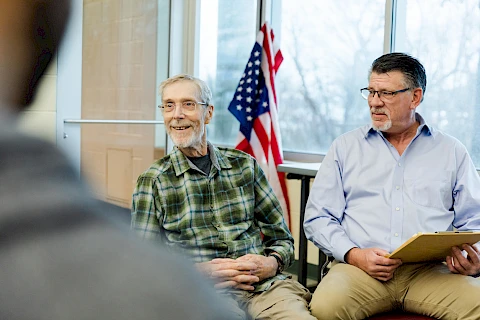
Post Traumatic Stress Disorder (PTSD) is often associated with the emotional scars left by the terrains of war. It is, unfortunately, a common and impactful issue among our senior veterans. Understanding the signs, symptoms, and treatment strategies for senior PTSD can help prioritize supportive and comprehensive care for our heroes.
What Is PTSD?
Post Traumatic Stress Disorder (PTSD) is a mental health condition triggered by experiencing or witnessing a terrifying event. Military combat, a common scenario for many veterans, is one of the significant causes of PTSD in senior years. Among the senior population, veterans are notably at a higher risk of PTSD due to their exposure to war zones and other traumatic situations.
Common Signs and Symptoms
PTSD manifests in a combination of physical, emotional, and psychological symptoms. Physically, individuals may experience fatigue, sleep issues, or even chronic pain. The emotional and psychological signs can range from flashbacks, nightmares, and severe anxiety to uncontrollable thoughts about the event. These symptoms could disrupt daily routines and activities.
Seeking Support for PTSD
Family, friends, and health professionals are pivotal in the journey of a senior veteran dealing with PTSD. Recognizing the symptoms is the first step. Encouraging them to seek help is just as important. Left untreated, PTSD can escalate, causing severe emotional distress and potential health complications. Early recognition and professional intervention are essential to mitigate these issues.
Coping Strategies for Senior Veterans With PTSD
Several coping strategies can help manage PTSD effectively. Therapeutic strategies, such as eye movement desensitization and reprocessing (EMDR) and cognitive-behavioral therapy (CBT), have proven beneficial for many. Lifestyle adjustments can make a considerable difference. This includes maintaining a routine for physical activities, ensuring a balanced diet, and establishing a steady sleep cycle. Seniors must always consult a doctor before starting a new fitness routine.
Social support is also integral in coping with PTSD in senior years. Veterans' support groups offer a safe space to share experiences and gain comfort from peers who understand their struggles. Involving family members in the healing process fosters a better understanding of the condition and creates a supportive environment.
Resources Available for Senior Veterans With PTSD
There are numerous resources aimed at assisting senior veterans with PTSD. Many local organizations provide a range of support services tailored to their needs. Nationally, the Department of Veterans Affairs and the National Center for PTSD provide extensive resources, including therapeutic services, support groups, and informational materials.
Experience Top-Notch Veterans Care at Senior Helpers
At Senior Helpers Westford, the well-being of our seniors, especially our veterans, is our utmost priority. Our comprehensive in-home care services aim to provide senior veterans with the care they deserve. Whether you need help with personal care, assistance with daily living activities, or support in other aspects of senior care, we are here for you. Contact us to learn more about our senior care services in and around Westford, Tewksbury, Lowell, or Concord.